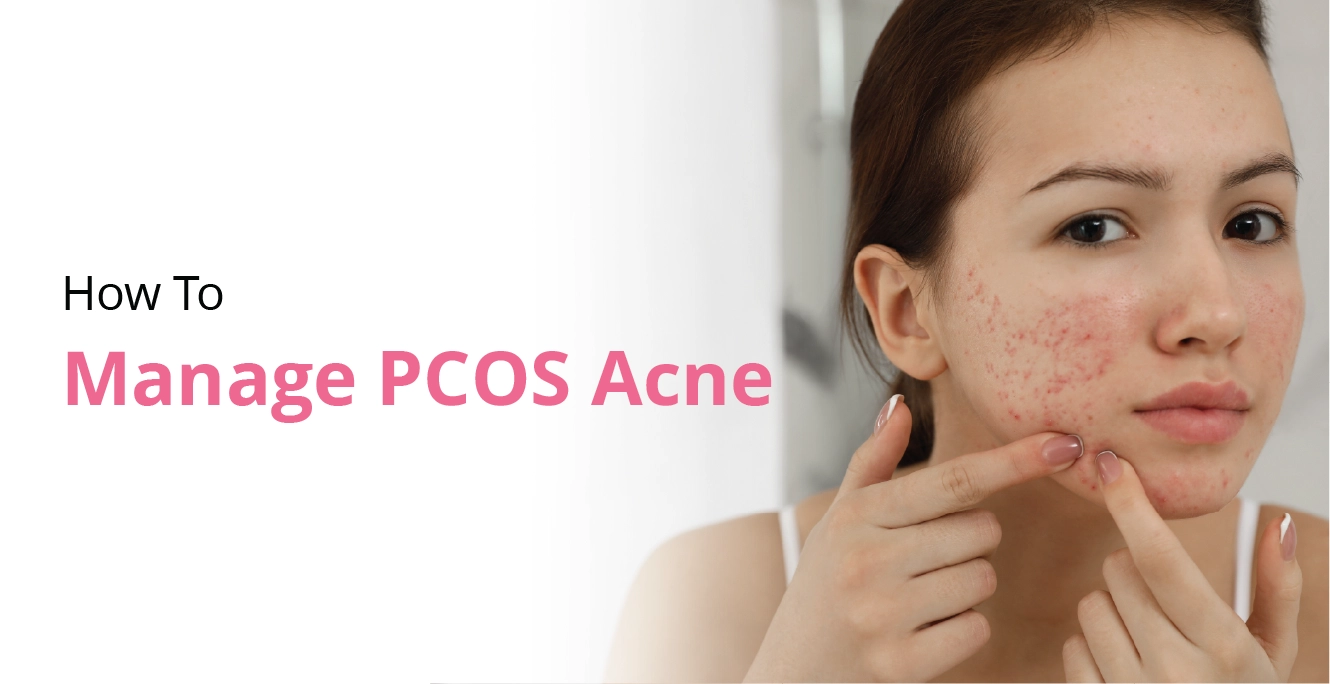
Understanding PCOS-Related Infertility

Table of Contents
PCOS, often known as polycystic ovarian syndrome, is a complicated hormonal disorder. In this complex condition, cysts begin to grow around the ovaries. Women who are in their reproductive years are often affected by PCOS and may face issues getting pregnant or achieving conception. Some women might not recognize PCOD’s warning signs and symptoms until they are already experiencing its effects. In this blog, we will cover the complex correlation between PCOS and infertility and how we can manage PCOS infertility to seek positive results. But before that, let’s understand what polycystic ovarian syndrome (PCOS) is all about and how it causes infertility.
How are PCOS and infertility related?
Although the precise cause of PCOD is not well understood, it is thought that a mix of genetic and environmental factors may be responsible for the emergence of this condition. Typically, In PCOD, small follicles (cysts) develop in the ovaries as a result, which may prevent eggs from releasing and may also restrict the production of viable eggs. It raises the possibility of getting other diseases like type 2 diabetes, hypertension, and endometrial cancer. You may have PCOD or be going through any unsettling symptoms. In that instance, it’s crucial to speak with a specialist who can accurately diagnose PCOD and suggest suitable PCOD treatment choices based on the individual’s circumstances.
How does PCOS cause infertility?
Women’s fertility health can be significantly impacted by Polycystic Ovary Syndrome (PCOS). Here are a few factors that explain how PCOS infertility impacts the overall quality of a woman’s life:
- Irregular Periods: Because of hormonal imbalances caused by PCOS, menstrual periods are frequently erratic or nonexistent. Also, irregular ovulation, also known as anovulation, is frequent, so it might be difficult to anticipate viable times for conception.
- Ovulation Abnormality: Normal ovulation can be hampered by hormonal abnormalities, especially high levels of androgens (male hormones) and insulin resistance. The likelihood of conception is decreased by irregular or absent ovulation.
- Ovarian Cysts: On the ovaries, there are several cysts in different sizes that are a sign of PCOS. These cysts may prevent an egg from releasing normally during ovulation.
- Imbalances in Hormones: In PCOS, elevated luteinizing hormone (LH) levels and insulin resistance are typical. The maturation of eggs and the growth of follicles may be adversely impacted by these abnormalities.
- Increasing Miscarriage Risk: Due to hormonal imbalances or poor egg quality, PCOS-afflicted women are more likely to experience miscarriage.
- Greater Chance of Complications During Pregnancy: Preterm birth, gestational diabetes, and preeclampsia are all prenatal conditions that are made more likely by PCOS.
- Effect on Egg Quality: Egg quality may be impacted by PCOS, which could lower the likelihood of successful fertilisation and normal embryo development.
- PCOS and weight: Maintaining too much weight or irregular body weight might make PCOS symptoms worse and make it harder to get pregnant. In order to improve reproductive outcomes for PCOS-afflicted women, weight management is frequently advised.
- Psychological Stress: Stress and anxiety can worsen reproductive problems caused by the emotional toll of PCOS-related fertility issues.
- Potential Treatment Options: Specialised fertility treatments, such as ovulation induction with drugs like Clomid or assisted reproductive technologies like In vitro fertilisation (IVF), are frequently necessary for women with PCOS.
How is PCOS infertility diagnosed?
A thorough evaluation by medical professionals is necessary to diagnose PCOS infertility. Here, are a few essential procedures and techniques for diagnosing PCOS infertility:
- Clinical Assessment: A thorough medical history and physical examination are the first steps in the procedure. In addition to obesity, women with PCOS may exhibit irregular menstrual periods and excess androgen symptoms such as hirsutism or acne. These are vital signs that notify medical professionals of the potential for PCOS-related infertility.
- Blood Tests: Blood tests are done to check the levels of certain hormones. PCOS is frequently characterised by elevated levels of luteinizing hormone (LH), insulin, testosterone, and anti-Müllerian hormone (AMH). These hormonal imbalances can interfere with ovulation, which can increase the risk of infertility.
- Exclusion of Other Causes: PCOS infertility is a diagnosis of exclusion, meaning other potential causes of infertility must be ruled out. This may involve assessing the male partner’s fertility, evaluating the fallopian tubes, and checking for endometriosis or other reproductive disorders.
- Metabolic Assessments: Given the strong association between insulin resistance and PCOS, some individuals may undergo glucose tolerance tests or other metabolic assessments to assess insulin sensitivity. Managing insulin resistance can improve fertility outcomes.
- Consultation with Specialists: Patients with PCOS-related infertility often consult with reproductive endocrinologists or fertility specialists. These experts can provide more specialized treatments and interventions tailored to the individual’s needs.
- Ovulation tracking: It’s crucial to keep track of menstrual cycles and ovulation. Anovulation, or lack of ovulation, is a common cause of irregular or absent menstrual cycles in women affected by PCOS. Ovulation can be verified using ovulation predictor kits, basal body temperature monitoring, or hormonal testing.
Type of PCOS Infertility Treatment
Managing Polycystic Ovary Syndrome (PCOS) for fertility can be quite a challenge. There are strategies you can consider;
- Seek guidance: Start by consulting a healthcare provider, a specialist, in reproductive endocrinology or gynaecology who has expertise in fertility issues. They will assess your situation. Suggest personalized treatments.
- Lifestyle adjustments: Maintain a healthy and regular body weight, shedding excessive weight (if overweight) or gaining weight (if underweight) can improve fertility.
- Balanced diet: Focus on consuming a rounded diet that includes plenty of fruits, vegetables, whole grains and lean proteins. You might also consider following an index diet to manage insulin levels effectively.
- Regular exercise: Engaging in activities on a regular basis can regulate hormones and improve insulin sensitivity.
- Medications: Here are a few fertility drugs and injections that are commonly advised to boost fertility in women:
- Metformin is sometimes prescribed to enhance insulin sensitivity.
- Clomiphene citrate is a medication used to stimulate ovulation.
- Letrozole is an alternative to Clomiphene for inducing ovulation.
- Gonadotropins are injectable hormones used when other medications prove ineffective.
- Ovulation monitoring: Keep track of your cycle, regularly monitor basal body temperature changes, or use ovulation predictor kits to identify fertile days.
- In vitro fertilization (IVF): If other treatments fail to yield results, IVF may be considered as an option where eggs are retrieved, fertilized outside the body, and then implanted into the uterus.
Conclusion:
Keep in mind that each person’s experience with PCOS is unique, so what works for one person may not work for another. To create a treatment strategy that is customised for your unique requirements and objectives. The strategies given in the article offer ways to manage PCOS infertility based on medical advice and individual circumstances. Under certain circumstances, surgery might be required to eliminate cysts or improve fertility. It’s important to manage stress levels, as they can have an impact on fertility. Consider incorporating stress reduction methods such as yoga, meditation, or counselling. Collaborating closely with a PCOS infertility expert is essential to developing a treatment plan that can help you achieve conception. If you are diagnosed with PCOS and facing fertility issues, consult our expert today by calling the given number or filling in the required details in the form to book an appointment with us.
Frequently Asked Questions (FAQs)
- Can a woman with PCOS become pregnant?
While it is not impossible for a woman with PCOS to become pregnant on her own, there are specific instances in which many of these women may need the help of a fertility specialist.
The good news is that women can become pregnant with the help of fertility drugs. The majority of women with polycystic ovarian syndrome will be able to get pregnant with reproductive treatment.
- What is the prevalence of PCOS infertility?
There is a strong correlation between polycystic ovaries and infertility. A lot of women are more likely to experience difficulties conceiving and will require treatment to increase their chances. While some polycystic ovarian syndrome sufferers regularly ovulate (release a mature egg), others never do. Women must ovulate in order for sperm to recognize and fertilise a ripe egg during conception.
- Is PCOS infertility treatable?
Though the exact cause of PCOS has not yet been discovered, there are various treatment options that can help you manage the symptoms of PCOS infertility. Some of the significant PCOS infertility treatments are lifestyle modification, birth control pills, and assisted reproduction techniques like IVF or IUI.
- Does PCOS affect a woman’s fertility?
Conditions such as polycystic ovarian syndrome can make it tougher for women to become pregnant. However, fertility enhancing treatments can help women conceive despite these complications.
Our Fertility Specialists
Related Blogs
To know more
Birla Fertility & IVF aims at transforming the future of fertility globally, through outstanding clinical outcomes, research, innovation and compassionate care.
Had an IVF Failure?
Talk to our fertility experts

 Our Centers
Our Centers













